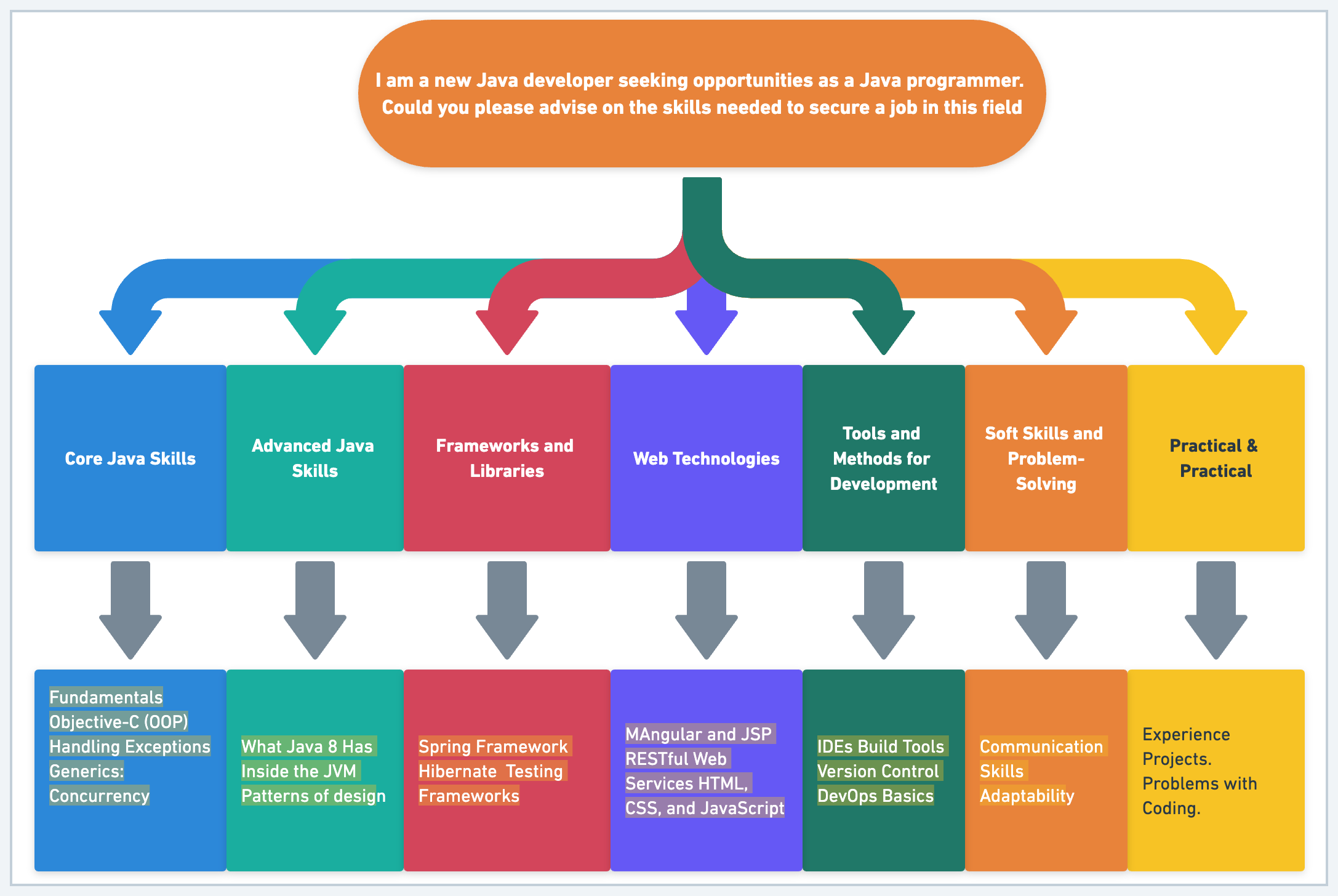Background : I’m a Java developer seeking opportunities as a Java programmer. Could you please advise on the skills needed to secure a job in this field
Summary: To get a job as a Java developer, you need to have strong technical skills, real-world experience, and the ability to learn and adapt. You can improve your chances of getting a good job in this field by focusing on these areas. Making connections with other professionals and keeping up with the latest trends in your field can also lead to useful opportunities and information.
If you are a new Java developer looking for a job as a Java programmer, it is important to focus on building a strong foundation in Java and related technologies. When employers look for people, these are some of the skills and knowledge they like to see:
-
Core Java Skills:
- Fundamentals: Know about basic ideas like data types, operators, control flow statements, error handling, and variables.
- Objective-C (OOP): Learn the basic ideas behind OOP, like encapsulation, inheritance, polymorphism, and abstraction.
- Handling Exceptions: To make strong apps, learn how to handle exceptions.
In the collections framework, you should learn about collections like lists, sets, maps, and queues and know when to use each one. - Generics: Learn how to write type-safe code with generics.
- Concurrency: Master the basics of Java’s multithreading and concurrency features.
-
Advanced Java Skills:
- What Java 8 Has: Learn how to use lambda expressions, the Stream API, and other new features in Java 8.
- Inside the JVM: Know the basics of how the Java Virtual Machine (JVM) works, such as how to manage memory and collect garbage.
- Patterns of design: Common design patterns include Singleton, Factory, Observer, and Decorator. Learn what they do and how to use them.
-
Frameworks and Libraries:
- Spring Framework: Learn the basics of the Spring Framework, including Spring Boot for microservices, Spring MVC for web applications, and Spring Data JPA for database access.
- Hibernate: Understand object-relational mapping (ORM) with Hibernate for database operations.
- Testing Frameworks: Get acquainted with testing frameworks like JUnit for unit and integration testing.
-
Web Technologies:
- Angular and JSP: Learn how to use Java Servlets and JavaServer Pages to make web applications.
- RESTful Web Services: Learn how to use frameworks like Spring MVC or Jersey to make and use RESTful services.
- HTML, CSS, and JavaScript: For full-stack development jobs, it can be helpful to know the basics of these front-end technologies.
-
Tools and Methods for Development:
- IDEs: Learn how to use Integrated Development Environments (IDEs) like NetBeans, Eclipse, and IntelliJ IDEA well.
- Build Tools: To manage projects and speed up the building process, learn how to use build tools like Maven and Gradle.
- Version Control: To manage code, you should know how to use version control systems, especially Git.
- DevOps Basics: Learn about the basic principles of DevOps, such as CI/CD pipelines for continuous integration and deployment.
-
Soft Skills and Problem-Solving:
- Problem-Solving Skills: Get better at thinking algorithmically and solving hard problems.
- Communication Skills: Work on your communication skills so you can work well with others on your team and with stakeholders.
- Adaptability: Be ready to learn new frameworks and technologies as needed for the job.
-
Practical
-
- Experience Projects: Build and contribute to Java projects to put what you’ve learned to use in the real world. This can also help you show potential employers what skills you have.
- Problems with Coding: Take part in coding challenges on sites like CodeSignal, HackerRank, or LeetCode to get better at writing code and solving problems.

